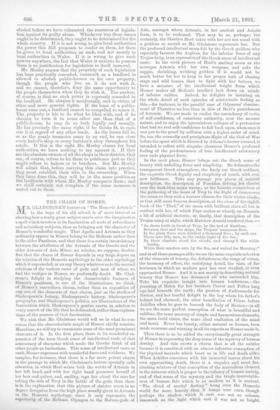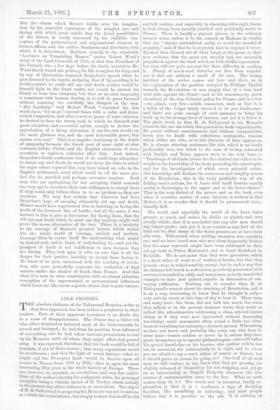THE CHARM OF HOMER.
MR. GLADSTONE'S lecture on "The Homeric Artemis" to the boys of his old school, is of more interest as showing how a really great subject exerts over the imagination a spell which involves in its fascination all sorts of subordinate and subsidiary subjects, than as bringing out the character of Homer's wonderful magic. That Apollo and Artemis as they ordinarily appear in Homer belong to the Hellenic rather than to the older Pantheon, and that there is a certain inconsistency between the attributes of the Artemis of the Greeks and the older Artemis of Asia Minor, no scholar, we suppose, doubts. But that the charm of Homer depends in any large degree on the relation of the Homeric mythology to the older mythology which it superseded, or on any theory whatever as to the mutual relations of the various races of gods and men of whom we find the vestiges in Homer, we profoundly doubt. Mr. Glad- stone's delight in studying the characteristic features of Homer's pantheon, is one of the illustrations, we think, of Homer's marvellous charm, rather than an exposition of any one of the elements of that charm, just as the studies of Shakespeare's botany, Shakespeare's history, Shakespeare's geography, and Shakespeare's politics, are illustrations of the fascination which Shakespeare's genius exerts in relation to every aspect of the life that he delineated, rather than explana- tions of the sources of that fascination.
We wish that Mr. Gladstone would tell us in what he con- ceives that the characteristic magic of Homer chiefly consists. Meantime, we will try to enumerate some of the most prominent elements of it. In the first place, there is its wonderful ex- pression of the keen Greek sense of intellectual rank, of that aristocracy of character which made the Greeks think of all other people as barbarians. This sense of intellectual caste or rank, Homer expresses with wonderful force and vividness. We imagine, for instance, that there is a far more potent charm in the passage to which Mr. Gladstone's lecture specially calls attention, in which Herb seizes both the wrists of Artemis in her left hand, and with her right hand possesses herself of her bow and quiver, and, smiling, raps her about the ears for taking the side of Troy in the battle of the gods, than there is in the explanation that this picture of sinister acorn in no degree derogates from the high place usually given to Artemis in the Homeric mythology, since it only represents the superiority of the Hellenic Olympus to the Nature-gods of Asia, amongst whom Artemis, in her ancient and Asiatic form, is to be reckoned, That may be so, perhaps ; but
certainly, the liberties Her takes with her are not usual with a goddess so sacred as Mr. Gladstone represents her. But the profound intellectual scorn felt by the Greek goddess who especially favours the Argives, for the inferior force of any Trojan deity, is an expression of the Greek sense of intellectual caste. In the vivid picture of Herb's smiling scorn as she scourges Artemis with her own weapons, and asks the supple, shrinking, writhing goddess if it would not be much better for her to keep to her proper task of chasing stags and wild beasts, than to fight with her betters, we have a measure of the intellectual height from which
Homer makes all Hellenic intellect look down on minds of inferior calibre. Indeed, he delights in insisting on
the whole detail of such episodes of aristocratic feeling as this,—for instance, in the parallel case of Odysseus' chastise- ment of Thersites no less than in this of Herb's punishment of Artemis. We are made to realise the ascendency of caste, of self.confidence, of conscious authority, over the meaner nature, and to enjoy the ignominious collapse of a pretension that had no real self-confidence to fall back upon, when once it was put to the proof by collision with a higher order of mind. So, too, the cowardly and piecipits.te flight of the God of War before the spear which is directed by Athens's keener counsel, is intended to reflect with singular clearness Homer's profound feeling of the predominance of true intellectual aristocracy over rude physical force.
In the next place, Homer brings out the Greek sense of beauty with unfailing force and simplicity. He delineates the transparent Greek atmosphere, the finely cut Greek outlines, the exquisite Greek dignity and simplicity of touch, with ever
new brilliance. Take any passage you please of natural description, the description of Poseidon driving his chariot over the dark-blue ocean waves ; or the famous comparison of the gathering of the hosts of Troy to the flight of cranes over
the ocean as they seek a warmer climate for their winter abode ; or that still more famous description, at the close of the eighth book of the "Iliad," of the moon with brilliant stars all but in contact with her, of which Pope makes so utterly un-Homeric a bit of artificial rhetoric; or, finally, that description of the Trojan camp at night, which Matthew Arnold rendered thus :— " So shone forth in front of Troy, by the bed of Xanthus, Between that and the ships, the Trojans' numerous fires. In the plain there were kindled a thousand fires ; by each one There sate fifty men, in the ruddy light of the fire;
By their chariots stood the steeds, and chanip'd the white barley, While their masters sate by the fire, and waited for Morning :"
and in all these passages alike we see the same exquisite selection of the elements of beauty, the definiteness, the range of vision, the harmony of effect, the satisfying detail, the vista of far
horizons, in which no modern poet has ever rivalled, or even approached Homer. And it is not merely in describing natural beauty that Homer has distanced all who succeeded him.
Take his exquisite insight into human tenderness,—the yearning of Helen for her brothers Castor and Pollux long ago laid beneath the earth ; the passion of Andromache for Hector, and her tearful delight in the boy whom his father's helmet had alarmed; the utter humiliation of Priam before Achilles when he goes to beseech the body of Hector,—in all we see the same perfect conception of what is beautiful and sublime, the same mastery of simple and harmonious elements, the same lucid vision, the same ideal exaltation of the mind and heart. Never has beauty, either natural or human, been made so serene and winning in all its aspects as Homer made it.
Then there is to be added the exceptionally great strength of Homer in expressing the deep sense of the mystery of human destiny. And this exerts a charm that is all the subtler because it is combined with an almost infantine conception of the physical marvels which beset us in life and death alike.
When Achilles converses with his immortal horses about his own approaching death, there is a singular and most fas- cinating mixture of that conception of the marvellous element in the universe which is proper to the infancy of human society, and of that sense of the mystery and the tragic inscrutable- ness of human fate which is as modern as it is ancient.
"The cloud of mortal destiny" hung over the Homeric world far more heavily than it hangs over ours, though perhaps the shadow which it cast was not so solemn, inasmuch as the light which cast it was not so bright. But the charm which Homer wields over the imagina- tion by his powerful expression of the mingled awe and daring with which great minds face the dread possibilities of the future, is vastly increased by his childlike con- ception of the preternatural and supernatural element in human affairs, and the artless frankness and directness with which it is introduced. Matthew Arnold, in the admirable "Lectures on Translating Homer," 'quotes Robert Wood's story of the Lord Granville of 1762, at that time President of the Council, who, a few days before his death, insisted to Mr. Wood that it would not prolong his life to neglect his duty, and by way of illustration repeated Sarpedon's speech when he goes forward to the battle, declaring that if by avoiding it he could contrive to evade old age and death, neither would he himself fight in the front ranks, nor would he entreat his friend to bear him company, but that as no such immunity is consistent with human destiny, it is well to press forward without counting too carefully the dangers in the way. "His Lordship," said Robert Wood, "repeated the last word (rotafe, let us go ') several times with a calm and deter- mined resignation, and after a serious pause of some minutes, he desired to have the treaty read, to which he listened with great attention, and recovered spirits enough to declare the approbation of a dying statesman (I use his own words) on the most glorious war, and the most honourable peace, this nation ever saw." That is a singular testimony to the depth of sympathy between the Greek poet of some eight or nine centuries before Christ, and the English statesman of some seventeen or eighteen centuries after him. And, indeed, Sarpedon's frank confession that if he could hope altogether to escape ago and death, he would not incur the risks to which his eager valour exposed him, may have raised an echo in the English nobleman's mind which would be all the more per- fect for its guarded and perhaps excessive candour. Bold men who are apologising for not accepting timid counsels are very apt to overstate their own willingness to accept them if they could only believe them to be as prudent as they are cautious. We may feel certain that whatever had been Sarpedon's hope of escaping ultimately old age and death, Homer would have represented him as insisting on facing the perils of the foremost line of battle ; but all the same, it was natural to him to give as his excuse for facing them, that the old age and death which he must one day undergo might well prove the worse alternative of the two. There is a'modesty in the courage of Homer's greatest heroes which makes kin the whole world of courage, ancient and modern. Courage likes to excuse itself for undertaking what might be termed rash, not to boast of undertaking it, —and yet the prospect of death is not indifferent to men because they are daring. They look upon it with an awe that is all the deeper for their positive inability to shrink from facing it. We know of no poet, unimbued with the teaching of revela- tion, who more powerfully expresses the exaltation of .high natures under the shadow of death, than Homer. And this when it is seen in close combination with an almost infantine conception of the supernatural or preternatural influences which beset our life, exerts a poetic charm that is quite unique.



































 Previous page
Previous page